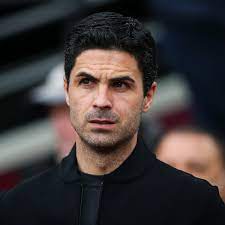As the seconds ticked down at the Emirates, Mikel Arteta could probably already see the headlines.

Against Manchester City – the team that has been the bête noire of his tenure as Arsenal boss – Arteta’s side were just minutes away from a ninth defeat at the hands of Pep Guardiola.
Sunday’s game was a different beast to what we have seen before. City got an early goal, then sat back and defended deep in a style more reminiscent of Jose Mourinho than of Guardiola.
It almost worked too. Pep packed his team with lofty giants, nullifying Arsenal’s set-piece threat and restricting them to minimal chances but one moment changed the game and the way we perceive it: a ball over the top and a smart finish from the fresh-legged Gabriel Martinelli.
In the immediate aftermath, it would have felt like a victory for Arsenal but days on, Guardiola will be the happier of the two managers, considering that the last time his team went to the Emirates, they were thrashed 5-1.
And as the euphoria of a last-minute equaliser faded, there was surely a sense of what could have been. As he did against Liverpool, Arteta decided to drop Eberechi Eze to the bench, despite an excellent showing against Nottingham Forest the previous weekend that showed the blueprint for how Arteta should set up his team.
Even against Athletic in midweek, Arteta started Eze and Noni Madueke and was rewarded with a 2-0 away win. And yet, something about Guardiola prompted Arteta to revert to a familiar focus – keep control and keep the ball out of your own net as a priority.
It is a theme that is becoming increasingly frustrating for the Premier League’s nearly men. The last three years have all seen Arsenal finish runners-up, each time unable to make that final step.
In fairness to Arteta, he has improved his side against the Big Six. When he joined in 2019, they averaged 1.17 points per game; last season that was up to two points, but there is still a sense that they need to do more.
Advertisement

To order your copy, send a WhatsApp message to +1 317 665 2180
The three teams Pep Guardiola has beaten most often in his career are Arsenal, Chelsea and Manchester United. Arsenal also top the list for Jurgen Klopp. Even Arsene Wenger’s record has Chelsea within his top five winning records.
Arteta has Chelsea in his top three, but the Stamford Bridge side have experienced a massive drop-off since Wenger’s years. The same goes for Manchester United, who sit fourth on Arteta’s most-beaten list. Against City and Liverpool (the only title winners since 2017), Arteta has a combined record of 32 games, nine wins, eight draws and 15 losses.
In the early days of his tenure, there was a fair argument that he did not have the players with which to compete against the top clubs, but now he very much does and he is still opting not to use some of them.
This control-focused approach has its pros and cons. For a start, Arteta’s teams rarely get smashed; their biggest defeat last season was 2-0, and they conceded the fewest goals in the league. But the era of defences win Premier Leagues has long gone.
Last season, Arsenal scored 17 goals fewer than Liverpool. Manchester City outscored them the year before. The last time a team won the league with fewer than the 69 goals Arsenal scored last year was Leicester in 2016.

Big Chances created table for 2025/26:
The competitive nature of the modern Premier League also means you simply cannot afford to drop points in more than a handful of games.
In the 2021/22 season, City slipped up in only nine games and still won the league by just a single point. The following two years, they dropped points in just 10 games. Last season was a bit of an outlier, with four of Liverpool’s 13 failures to win coming after they had already secured the title. But Arsenal have already dropped points in two games, while Liverpool are five from five.
And while Arteta’s reluctance to throw at least some caution to the wind against the big teams could cost them in the Premier League, it may be a tactic that brings them Champions League success for the first time in the club’s history.
If league campaigns are marathons, cup competitions are more like boxing matches – who can take and give the most punches in a short space of time before moving on to the next opponent and starting fresh.
Knockout football is often decided in one of two ways – teams who keep it tight and win by a goal or two like Mourinho’s Inter or teams who are confident they will outscore any opponent like Zidane’s Madrid or Enrique’s Barcelona.
Arsenal deployed the former method to fantastic effect last season, particularly when they faced Real Madrid, with Mikel Merino starting up front in the home leg. That extra defensive focus ensured an on-paper-superior Madrid attack of Mbappe and Vinicius Jr. could not break through.
But this approach does also require fortune to go your way. Arsenal were two Declan Rice free-kicks away from a disappointing result at home and then needing to go to the Bernabeu to win.
You also have to be fortunate about who you face and when. Arsenal defeated PSG 2-0 in the group stage but the French side were a different team when they met again in the semi-finals.
Could Arsenal have beaten PSG in a one-legged game? Possibly, but over two legs, Arsenal failed to capitalise on home advantage and trying to overturn a 1-0 scoreline away from home proved a task too big.
A 2-0 away win was an excellent way to start their 24th attempt at Europe’s top trophy and whether it was by design or coincidence, Arteta has built a team that is ready to go all the way in the Champions League. But that all-or-nothing approach may not save him should it be another trophyless year.
Credit: www.football365.com

















